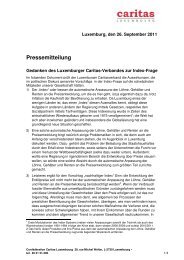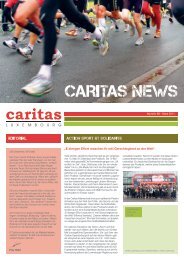Sozialalmanach - Caritas Luxembourg
Sozialalmanach - Caritas Luxembourg
Sozialalmanach - Caritas Luxembourg
Create successful ePaper yourself
Turn your PDF publications into a flip-book with our unique Google optimized e-Paper software.
make the necessary investments in healthcare and welfare to support such a development. In<br />
the US, on the other hand, the social debate since the onset of the crisis has focused almost<br />
exclusively on healthcare reform. There are significant political hurdles to achieving such<br />
reform, as the bitter and even violent debates on the issue in the US demonstrate. Obama<br />
is cautious about taxes, but according to Nancy Birdsall 51 , a shift towards a more European<br />
social model and a retreat from the ‘cowboy’ model of capitalism seems inevitable, in spite<br />
of the American emphasis on low taxes and low government expenditures.<br />
Future productivity growth is likely to come from sources like green energy and low<br />
carbon path investments. However, the challenge, writes Nancy Birdsall, will be to find<br />
funding, from either the market or the government, to finance the R&D that forms the<br />
backbone of these new sectors of the low-carbon economy.<br />
Going beyond welfare state recalibration and sustainable development as separate<br />
phenomena, Jacques Delors, Tony Atkinson, and Jean-Paul Fitoussi 52 underscore the need<br />
for different set of indicators of social and economic progress exceeding the traditional<br />
measure of GDP growth. In fact, the crisis is partially the result of the exclusive focus<br />
on economic growth. The formulation of a new portfolio of social and economic indicators<br />
(including, for example, various dimensions of adult numeracy and literacy, access<br />
to public services, poverty, and environmental health and climate control) is especially<br />
politically opportune in the face of a period of lethargic and drawn-out recovery. GDP<br />
growth may no longer be an adequate proxy for ‘doing well’. To address this issue, in<br />
early 2008, Nicolas Sarkozy put together a committee of leading economists, chaired<br />
by Joseph Stiglitz, Amartya Sen and Jean-Paul Fitoussi, to rethink GDP as an indicator<br />
of economic performance and to consider alternative indicators of social progress. The<br />
unifying theme of the report that came out in September 2009 is that the time is ripe for<br />
shifting measurement from indicators of economic production to people’s income and<br />
consumption, jointly with wealth, with an emphasis households perspective. In other words,<br />
the Commission renders more prominence to the distribution of income, consumption<br />
and wealth, in correspondence with sustainability indicators 53 . What is interesting to note<br />
here is that economic progress and international coordination, in the views presented by<br />
Delors, Fitoussi, Atkinson, Birdsall and Rodrik 54 , are made contingent upon substantive<br />
policy choices, such as poverty reduction and climate management, in much the same way<br />
as the regime of ‘embedded liberalism’ hinged on (male) full employment and adequate<br />
51 Birdsall (2008).<br />
52 Delors (2006); Atkinson et al. (2002); Fitoussi (2009).<br />
53 Stiglitz et al. (2009).<br />
54 Delors (2006); Fitoussi (2009); Atkinson et al. (2002); Birdsall (2008); Rodrik (2007).<br />
179








